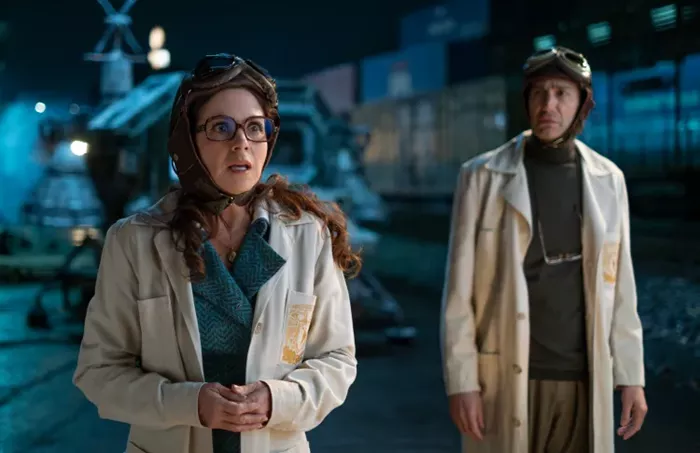Netflix’s new sci-fi romantic comedy Our Time offers a fresh take on the time travel genre. Unlike typical films that send characters back in time to prevent personal tragedies or disasters, this movie propels its protagonists into the future, focusing on how they make the most of the present. By adopting a novel and forward-looking approach, Our Time redefines the genre’s traditional emphasis on personal growth. However, the film could benefit from a deeper exploration of its core theme—gender equality.
Lucero, a multi-platinum singer and regular host of the Latin Grammy Awards, stars as Nora Esquivel, a physics professor in 1966 Mexico. Alongside her devoted husband Hector (played by Benny Ibarra), Nora works on developing a time machine. While Hector regards her as an equal partner, others at the National Autonomous University of Mexico tend to see her as Hector’s assistant. This dynamic is highlighted during a visit from the university’s dean, who praises Nora’s cooking but dismisses her scientific input. Hector, worried about jeopardizing their funding, refrains from challenging the dean.
This scenario echoes historical realities faced by women scientists. Rosalind Franklin paved the way for the discovery of DNA but was excluded from the Nobel Prize awarded to James Watson and Francis Crick. Chien-Shiung Wu made critical contributions to the Manhattan Project but was overlooked when her male colleagues received the 1957 Nobel Prize in Physics. Albert Einstein’s wife, Mileva Marić, also a physicist and mathematician, is speculated to have contributed to some of his theories. The CW series Legends of Tomorrow addressed a similar story in its second season, where characters break the usual time travel rules to ensure Marić receives credit for her work.
Writers Juan Carlos Garzón and Angélica Gudiño carry this theme forward in Our Time. When the Esquivel couple’s time machine inadvertently traps them in 2025, they seek help from Nora’s former student Julia—played by Carolina Villar in 1966 and Ofelia Medina in 2025—who is now the university’s dean. Julia eagerly assists while hoping to witness her idol’s talents in the modern era.
Lucero and Ibarra’s characters navigate the modern world with charming awkwardness—from clumsily handling 2020s technology to questioning contemporary fashion trends. Their amazement at the internet and electric toothbrushes is juxtaposed with a growing awareness of the dramatic shifts in gender and sexual norms. Hector quickly becomes the less talented partner, contrasting with Greta Gerwig’s Barbie, where male and female roles are also inverted.
However, Our Time lacks the forceful gender critique of Barbie, which argues that traditional gender roles constrain everyone, not just women. The chemistry between Lucero and Ibarra is natural and is best conveyed in tender moments—such as when they hold hands preparing to challenge Einstein’s theories—rather than through lengthy romantic scenes like dance sequences or spelling “I love you” with the periodic table.
This makes the quick dissolution of their marriage feel abrupt. Hector longs to return to the past, while Nora focuses on what life could be like if she truly lives in the present. This painful rift fractures what was once a passionate and supportive relationship, forcing Hector to confront the possibility that the qualities that made him a good husband and renowned scientist in 1966 may no longer apply in 2025.
Amid contemporary concerns over men falling behind women in education and careers, Our Time clearly positions Nora and Julia as symbols of modern women gaining recognition in STEM fields, rather than being overshadowed by mediocre men. Garzón and Gudiño might have deepened Hector’s storyline to elicit more empathy for his feelings of inadequacy and injustice. Yet this is confined to a painfully awkward International Women’s Day panel and a drunken social media rant.
Similarly, it would be helpful if 2020s characters responded to Hector’s outdated comments on women or his interruptions of Nora with the same disgust and confusion they show when he struggles to light a cigarette indoors. On the other hand, a compassionate male scientist recruited by Julia reassures Hector in just a few lines, humanizing him and addressing a related issue—the loss of male friendships under evolving gender norms.
Like The Time Traveler’s Wife and About Time, Our Time does not dwell on the mechanics or paradoxes of time travel, but rather on how traveling to another era affects the protagonists’ love lives. The script vaguely explains that their ramshackle time machine is powered by faster-than-light particles and wormholes, initially detailing why they cannot immediately return to the past, then imposing a clear deadline by which the Esquivel couple must decide whether to go back to 1966. Their fears of revealing scientific secrets to modern people are raised but ultimately go nowhere. Aside from acknowledging their brilliance, the film never fully reveals the true purpose behind their time travel.
Though the film’s science lacks depth, Our Time intimately explores the emotional impact of time travel, reflecting on how women are often forced to prioritize relationships over personal ambitions. Nora’s great-niece, Alondra (Renata Vaca), a physics student herself, challenges Nora’s worldview by openly discussing sex. Their trip to a sex shop humorously highlights Nora and Hector’s passion, leading into another conflict between Hector’s conservatism and Alondra’s adventurous spirit. More importantly, Alondra helps Nora resist the urge to return to her past family and encourages her to embrace new connections in the present.
Time travel stories often revolve around confronting regrets and finding a way forward despite mistakes and losses we cannot undo. Our Time offers a distinct interpretation by pushing the protagonists toward the future instead of backward. This unique perspective allows the filmmakers to focus on how people navigate regrets in linear time—choosing to change their lives and create a better future. Rather than fixating on repairing the past, Our Time is a bittersweet meditation on personal growth and how relationships evolve with changing environments.
Related Topics
- Drunken Noodles: A Playful Ode to Queer Desire and Intimacy
- ‘Militantropos’: An Unflinching Look at War in Ukraine
- Ranking All Six Karate Kid Films: A Definitive Review

